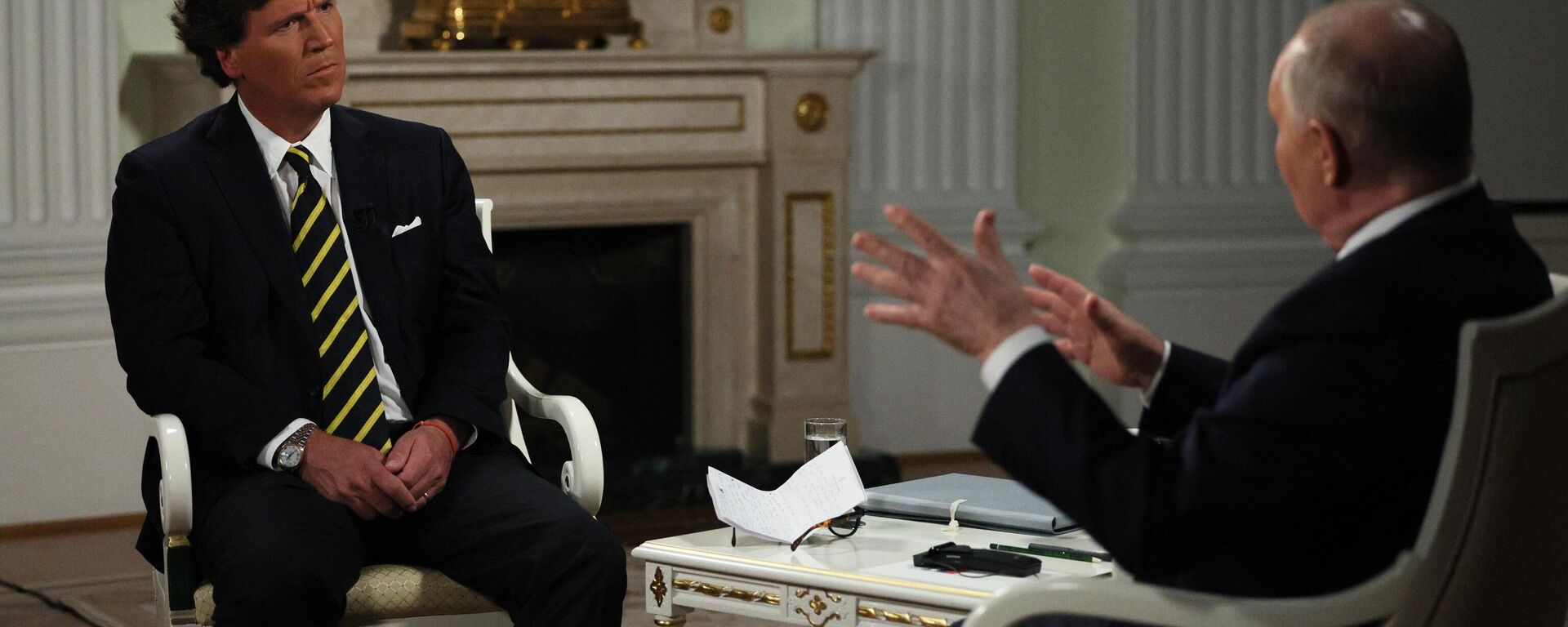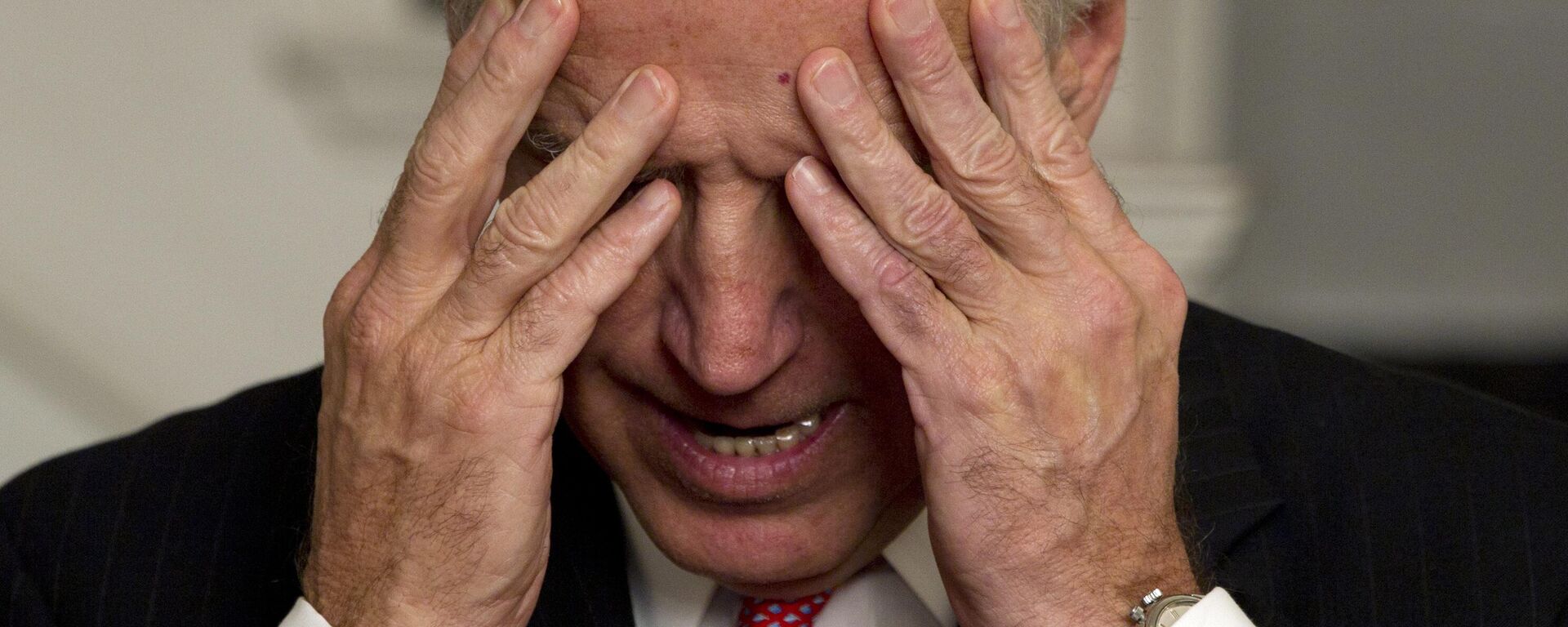https://sputnikglobe.com/20240209/putins-interview-helps-americans-understand-real-causes-of-ukraine-conflict--ex-pentagon-analyst-1116678987.html
Putin's Interview Helps Americans Understand Real Causes of Ukraine Conflict – Ex-Pentagon Analyst
Putin's Interview Helps Americans Understand Real Causes of Ukraine Conflict – Ex-Pentagon Analyst
Sputnik International
Russian President Vladimir Putin's interview will help Americans understand how external forces which want the conflict in Ukraine to further fester played a role in the 2014 coup d'etat in Kiev and today's proxy war, retired US Air Force Lt. Col. Karen Kwiatkowski told Sputnik.
2024-02-09T02:22+0000
2024-02-09T02:22+0000
2024-02-09T03:20+0000
world
us
russia
putin’s interview with tucker carlson
ukraine
nato
nato expansion
opinion
us military aid
proxy war
https://cdn1.img.sputnikglobe.com/img/07e7/0c/04/1115376098_0:0:3110:1750_1920x0_80_0_0_572b2fdec4451e9eaff9bb960d2b3d56.jpg
Tucker Carlson's interview with Vladimir Putin has shed light on the causes of the Ukrainian conflict which is "in many ways not normal" given Ukraine's deep historic, cultural and ethnic ties to Russia, as per retired US Air Force Lt. Col. Karen Kwiatkowski, a former analyst for the US Department of Defense.Putin's historic remarks have clearly shown to what extent the West meddled in Ukrainian affairs after the collapse of the USSR, fanned nationalist sentiment in the Eastern European state and eventually fomented a coup d'etat in 2014 which was completely unnecessary given that the legitimate Ukrainian leadership at the time sat down with the opposition and was ready to hold snap elections.Per Kwiatkowski, this interview actually helps drive home the message that the US arming of the Kiev regime and prolonging of the Ukraine conflict must be stopped, because it is unpopular, unaffordable and destroys the Eastern European country.She noted that "members of Congress, especially Republicans, will be watching this in order to see how it may inform them as to how this conflict is going, and what it is about."Most recently, the Senate voted to begin debate on a $95 billion aid package to fund Ukraine, Israel and other US allies. However, the US mainstream press admitted that the bill faces an "uphill battle" given that the debate will begin just days before the Senate’s two-week recess and just a few weeks before government shutdown deadlines in March. The legislation is a variant of the $118 billion bill earlier blocked by Republican senators and stripped of its border provisions.Previously, House Speaker Mike Johnson made it clear that the "compromise" bipartisan bill will be dead on arrival in the lower chamber. He and other conservative Republicans also signaled that the foreign aid package should not be rammed through the US Congress until measures to tackle the US border crisis are adopted.The US' deeper engagement in its proxy war in Ukraine is fraught with a risk of a direct conflict with Russia. When asked about the prospect of NATO-Russia war, Putin said: "If someone has the desire to send in American troops that would certainly bring humanity to the brink of a very serious global conflict... This conflict is taking place thousands of kilometers away from your national territory! Don't you have anything better to do?" Kwiatkowski believes this message will resonate in the United States.
https://sputnikglobe.com/20240208/key-statements-from-tucker-carlson-interview-with-president-putin-1116677179.html
https://sputnikglobe.com/20240208/ukraine-support-collapsing-what-are-bidens-options-to-fund-kiev-1116669518.html
https://sputnikglobe.com/20240208/never-been-as-bad-reaction-to-tucker-putin-sitdown-shows-collapse-of-us-free-speech-facade-1116676050.html
russia
ukraine
Sputnik International
feedback@sputniknews.com
+74956456601
MIA „Rossiya Segodnya“
2024
News
en_EN
Sputnik International
feedback@sputniknews.com
+74956456601
MIA „Rossiya Segodnya“
Sputnik International
feedback@sputniknews.com
+74956456601
MIA „Rossiya Segodnya“
vladimir putin's interview with tucker carlson, ukraine conflict, war in ukraine, nato expansion, russia-nato conflict, us proxy war in ukraine, us aid to ukraine, us border crisis, threat to us dollar
vladimir putin's interview with tucker carlson, ukraine conflict, war in ukraine, nato expansion, russia-nato conflict, us proxy war in ukraine, us aid to ukraine, us border crisis, threat to us dollar
Putin's Interview Helps Americans Understand Real Causes of Ukraine Conflict – Ex-Pentagon Analyst
02:22 GMT 09.02.2024 (Updated: 03:20 GMT 09.02.2024) Russian President Vladimir Putin's interview will help Americans understand how external forces which want the conflict in Ukraine to further fester played a role in the 2014 coup d'etat in Kiev and today's proxy war, retired US Air Force Lt. Col. Karen Kwiatkowski told Sputnik.
Tucker Carlson's interview with Vladimir Putin has shed light on the causes of the Ukrainian conflict which is "in many ways
not normal" given Ukraine's deep historic, cultural and ethnic ties to Russia, as per retired US Air Force Lt. Col. Karen Kwiatkowski, a former analyst for the US Department of Defense.
Putin's historic remarks have clearly shown to what extent the West meddled in Ukrainian affairs after the collapse of the USSR, fanned nationalist sentiment in the Eastern European state and eventually fomented a coup d'etat in 2014 which was completely unnecessary given that the legitimate Ukrainian leadership at the time sat down with the opposition and was ready to hold snap elections.
Per Kwiatkowski, this interview actually helps drive home the message that
the US arming of the Kiev regime and prolonging of the Ukraine conflict must be stopped, because it is unpopular, unaffordable and destroys the Eastern European country.
"Most public opinion here opposes sending money to Kiev," the former Pentagon analyst pointed out.

8 February 2024, 23:27 GMT
"Because it is an election year, and Biden is standing for re-election, his backers in the administrative state are very afraid of any presentation of 'a loss' in Ukraine. Hearing directly from President Putin and via his many incisive soundbites that will be replayed and discussed later for wider audiences will help Americans, although not the Biden administration. It will help the discussion that goes on in the US, and also Europe."
She noted that "members of Congress, especially Republicans, will be watching this in order to see how it may inform them as to how this conflict is going, and what it is about."
Most recently, the Senate voted to begin debate on a $95 billion aid package to fund Ukraine, Israel and other US allies. However, the US mainstream press admitted that the bill faces an "uphill battle" given that the debate will begin just days before the Senate’s two-week recess and just a few weeks before government shutdown deadlines in March. The legislation is a variant of the $118 billion bill earlier blocked by Republican senators and stripped of its border provisions.

8 February 2024, 16:22 GMT
Previously, House Speaker Mike Johnson made it clear that the "compromise" bipartisan bill will be
dead on arrival in the lower chamber. He and other conservative Republicans also signaled that the foreign aid package should not be rammed through the US Congress until measures to tackle the US border crisis are adopted.
Putin touched on US domestic issues during his interview with Carlson, explaining "what many people here also know, and that is the damage we are doing to our US dollar, and our own ability to be a strong, healthy, economically productive economy," said Kwiatkowski.
The US' deeper engagement in its proxy war in Ukraine is fraught with a risk of a direct conflict with Russia. When asked about the prospect of NATO-Russia war, Putin said: "If someone has the desire to send in American troops that would certainly bring humanity to the brink of a very serious global conflict... This conflict is taking place thousands of kilometers away from your national territory! Don't you have anything better to do?" Kwiatkowski believes this message will resonate in the United States.
"It will [resonate], as Americans don't want war," the former Pentagon analyst insisted.

8 February 2024, 22:21 GMT





